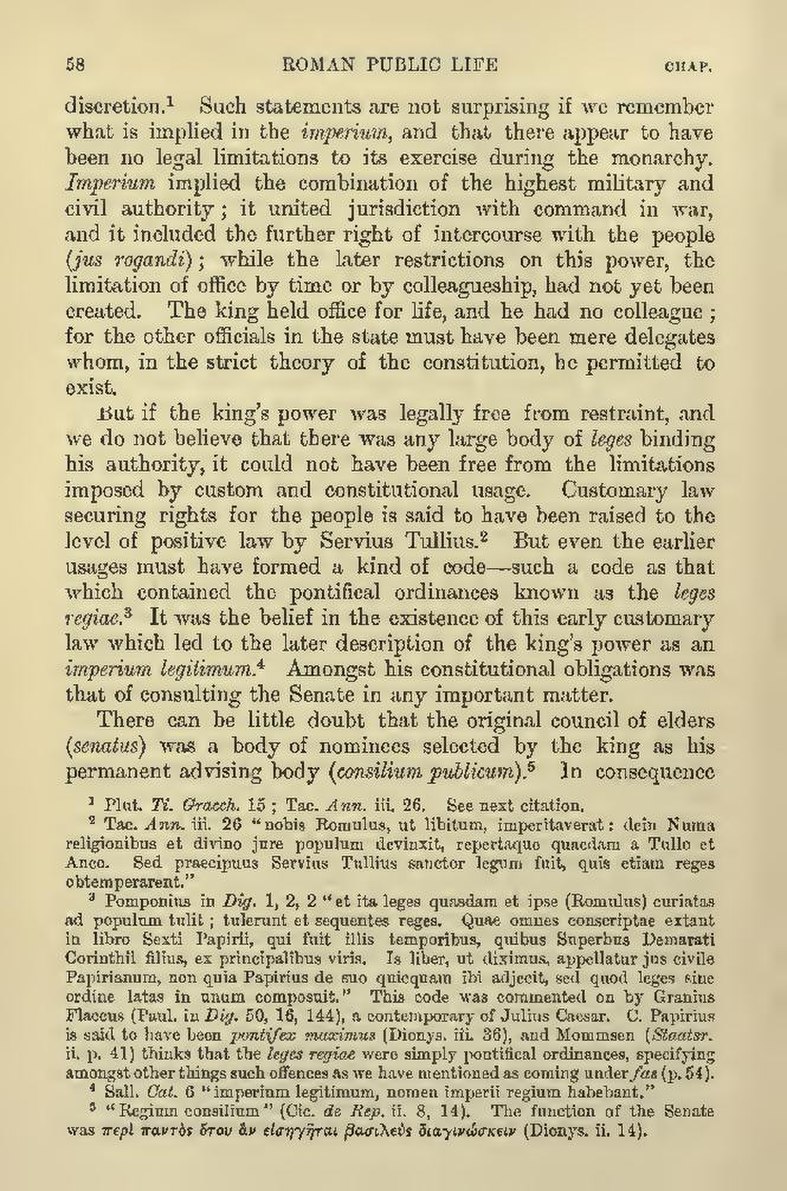discretion.[1] Such statements are not surprising if we remember what is implied in the imperium, and that there appear to have been no legal limitations to its exercise during the monarchy. Imperium implied the combination of the highest military and civil authority; it united jurisdiction with command in war, and it included the further right of intercourse with the people (jus rogandi); while the later restrictions on this power, the limitation of office by time or by colleagueship, had not yet been created. The king held office for life, and he had no colleague; for the other officials in the state must have been mere delegates whom, in the strict theory of the constitution, he permitted to exist.
But if the king's power was legally free from restraint, and we do not believe that there was any large body of leges binding his authority, it could not have been free from the limitations imposed by custom and constitutional usage. Customary law securing rights for the people is said to have been raised to the level of positive law by Servius Tullius.[2] But even the earlier usages must have formed a kind of code—such a code as that which contained the pontifical ordinances known as the leges regiae.[3] It was the belief in the existence of this early customary law which led to the later description of the king's power as an imperium legitimum.[4] Amongst his constitutional obligations was that of consulting the Senate in any important matter.
There can be little doubt that the original council of elders (senatus) was a body of nominees selected by the king as his permanent advising body (consilium publicum).[5] In consequence(Dionys. ii. 14).]
- ↑ Plut. Ti. Gracch. 15; Tac. Ann. iii. 26. See next citation.
- ↑ Tac. Ann. iii. 26 "nobis Romulus, ut libitum, imperitaverat: dein Numa religionibus et divino jure populum devinxit, repertaque quaedam a Tullo et Anco. Sed praecipuus Servius Tullius sanctor legum fuit, quis etiam reges obtemperarent."
- ↑ Pomponius in Dig. 1, 2, 2 "et ita leges quasdam et ipse (Romulus) curiatas ad populum tulit; tulerunt et sequentes reges. Quae omnes conscriptæ extant in libro Sexti Papirii, qui fuit illis temporibus, quibus Superbus Demarati Corinthii filius, ex principalibus viris. Is liber, ut diximus, appellatur jus civile Papirianum, non quia Papirius de suo quicquam ibi adjecit, sed quod leges sine ordine latas in unum composuit." This code was commented on by Granius Flaccus (Paul. in Dig. 50, 16, 144), a contemporary of Julius Caesar. C. Papirius is said to have been pontifex maximus (Dionys. iii. 36), and Mommsen (Staatsr. ii. p. 41) thinks that the leges regiae were simply pontifical ordinances, specifying amongst other things such offences as we have mentioned as coming under fas (p. 54).
- ↑ Sall. Cat. 6 "imperium legitimum, nomen imperii regium habebant."
- ↑ "Regium consilium" (Cic. de Rep. ii. 8, 14). The function of the Senate was [Greek: peri pantos hotou an eisêgêtai basileus diaginôskein
